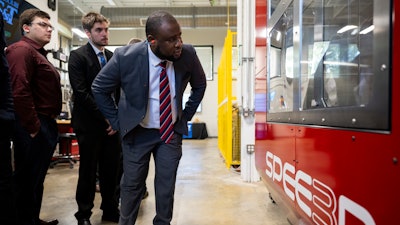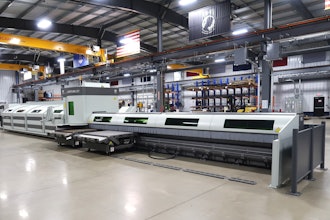
The Missouri Defense Manufacturing Consortium announced that it was awarded $5 million by the U.S. Department of Defense’s Office of Local Defense Community Cooperation for a three-year project.
The grant establishes the consortium, a partnership of colleges and universities, companies and manufacturing organizations led by Missouri S&T. Other consortium members include Lockheed Martin, Caterpillar, America Makes, the Missouri Association of Manufacturers and Ozarks Technical Community College.
"In order for Missouri to remain globally competitive in manufacturing, we must modernize the technology used by our state’s manufacturers,” said Dr. Richard Billo, director of the Kummer Center for Advanced Manufacturing at Missouri S&T, who also oversees the Missouri Protoplex and is the lead researcher for the consortium.
The Protoplex will serve as an organizational and physical hub for advanced manufacturing when it opens in 2025.
The consortium will provide training and education to at least 200 Missouri manufacturers to increase the number of engineers and tradespeople skilled in digital advanced manufacturing technologies as they are applied to two traditional methods of manufacturing: Casting, a process during which metal is heated until it’s molten, and then poured into a die, or mold, and forging, which uses automated or manually applied compression to reshape metal that’s been heated to the stage of being plastic.
Both methods are difficult for producing small quantities of parts quickly and at a low cost. These attributes are important for companies to competitively produce replacement parts for older equipment. By providing training on new and emerging technologies, the consortium plans to lessen the severe shortage of workers skilled in using advanced manufacturing technologies to repair, remanufacture and replace castings and forgings for the defense industry.
The consortium also hopes to combat what many see as the erosion of U.S. leadership in casting and forging manufacturing.
Specifically, the technical training and education offered by the Missouri Defense Manufacturing Consortium will be complemented by outreach activities provided by a team that includes OTC’s Robert W. Plaster Center for Advanced Manufacturing, the America Makes Manufacturing USA Institute and Missouri S&T’s Kummer Center for STEM Education to at least 5,000 K-12 students in more than 50 underserved counties across Missouri.
Billo said the consortium’s goals are a direct response to the concerns shared by the hundreds of small manufacturers and the equipment manufacturers they support. Billo has met with many small, mid-size and large companies since joining S&T in early 2022, and they’ve all expressed the need for more engineers and tradespeople with skills and interests in manufacturing.






















